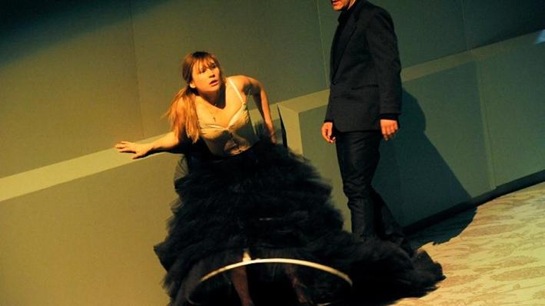
This spring term, as part of the Studio Theatre Class, ECLA of Bard is taking its students to performances in various theatres in Berlin to enable them to develop their perspective on the art of theatre-making, but also to offer a personal experience of Berlin, as one of the most vibrant sites for the art of theatre.
Theatre visits are not simply a recreation and break from the everyday-reality of intensive study, but are an integral part of academic education: after each performance students gather in class and discuss the ‘experience’ of theatre not only from the viewpoint of the spectator, but also from the perspective of the student actively involved in making theatre – as an actor or a director.
In this little piece of writing that for me is much more a personal impression and reflection rather than a structured account of the events, I will share my experience as a viewer and an actor from one of the theatre visits.
The first play we saw was Madame Bovary at Maxim Gorki Theatre. From my own vantage point, the play was created visually through a constant opposition between the richness of ‘spectacle’ that the text offers and the lack of the enactment of that particular spectacle in the spatial-visual reality of the stage.
This is not to say, however, that ‘spectacle’ was lacking as a whole. On the contrary, if one takes a mental recourse to the original linguistic connection between spectator and spectacle, one begins to forget that established tie between the scandalous, the provocative, and even the gory as quintessential features of ‘spectacle’.
The spectacular moments, in the original sense, gave the viewer her proper place in space as the spectator when they offered her glimpses into that which makes one uncomfortable and which cannot be experienced in any other way except as the seen, the witnessed. Those same moments refused the possibility for ‘cheap’ spectacle as the literal visualization of the text, the expectation that the ‘scandalous’ would be uncovered.
The space that the stage created was that of intriguing discomfort. The structure was that of a triangular ramp, or a ramp-cut pyramid. At the ‘vanishing’ point of the structure one could see the painting or picture of the Bovary family. Thus, the space created was that of perspectival play and also one of discontinuity, as the ‘tip’ of the cut pyramid was distorted––moved to the viewer’s left – and so disrupted the expectation of geometrical completion.
The staging played with the idea of the space: it was as if one was looking at a painting, which obeys most of the laws of perspective, at the same time making one feel uncomfortable as the ‘picture’ was moving, while calling upon the expectation of pictorial perspective without fulfilling it.
When the actors came to the edge of the stage and addressed the audience the feeling was even more bizarre: they were like speaking portraits, which at the same time were not ‘alive’ or moving freely enough in space to be considered real human beings. In a word, there were demands made on the spectator that led to a sense of near exhaustion, perhaps in a good way, perhaps not.
The play was by no means mere entertainment or passing of one’s time – it necessitated the active involvement of the viewer as the one who endures and witnesses.
The experience of witnessing brings me back to the idea of the spectacle, the unseen, the uncomfortable, the spectacular that can only be witnessed or endured, but never enjoyed simply. There were moments, however, in which the spectacular became so abstract that the burdensome experience of witnessing became the experience of the visual, or the beautiful, as sublime.
As Madame Bovary’s mental world approached its ultimate darkening and destruction, Jullischka Eichel (Emma Bovary) sat on the edge of the stage and one of the panels, forming the lateral side of the pyramid collapsed close to her.
There was an instant, in which she was looking at us, the audience, and then the whole thing was like a slow-motion sequence: the falling down of the wall, her hair getting disheveled for a moment, as if frozen in time. It was so fast, yet so very slow. It was as if the perspectival world that the stage created became gradually and uncomfortably the reality of the spectator and as it crumbled down, she tried to hold on to the moment, extend it, as if in disbelief.
Perhaps, this is the magic of theatre itself: when the reality of the spectator and the spectacle become one as ‘real time’ is expanded so as to be ‘theatre time’.
by Maria Androushko (1st year BA, Bulgaria)
